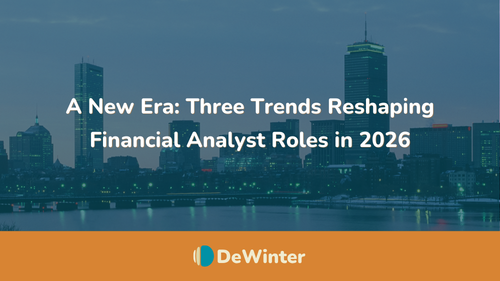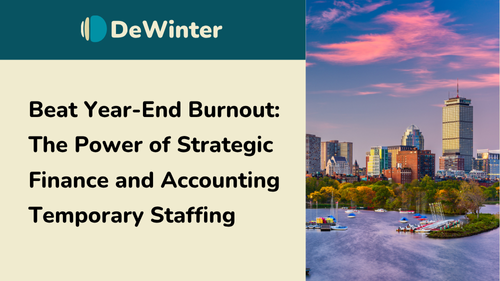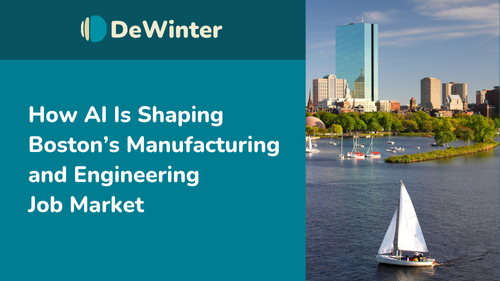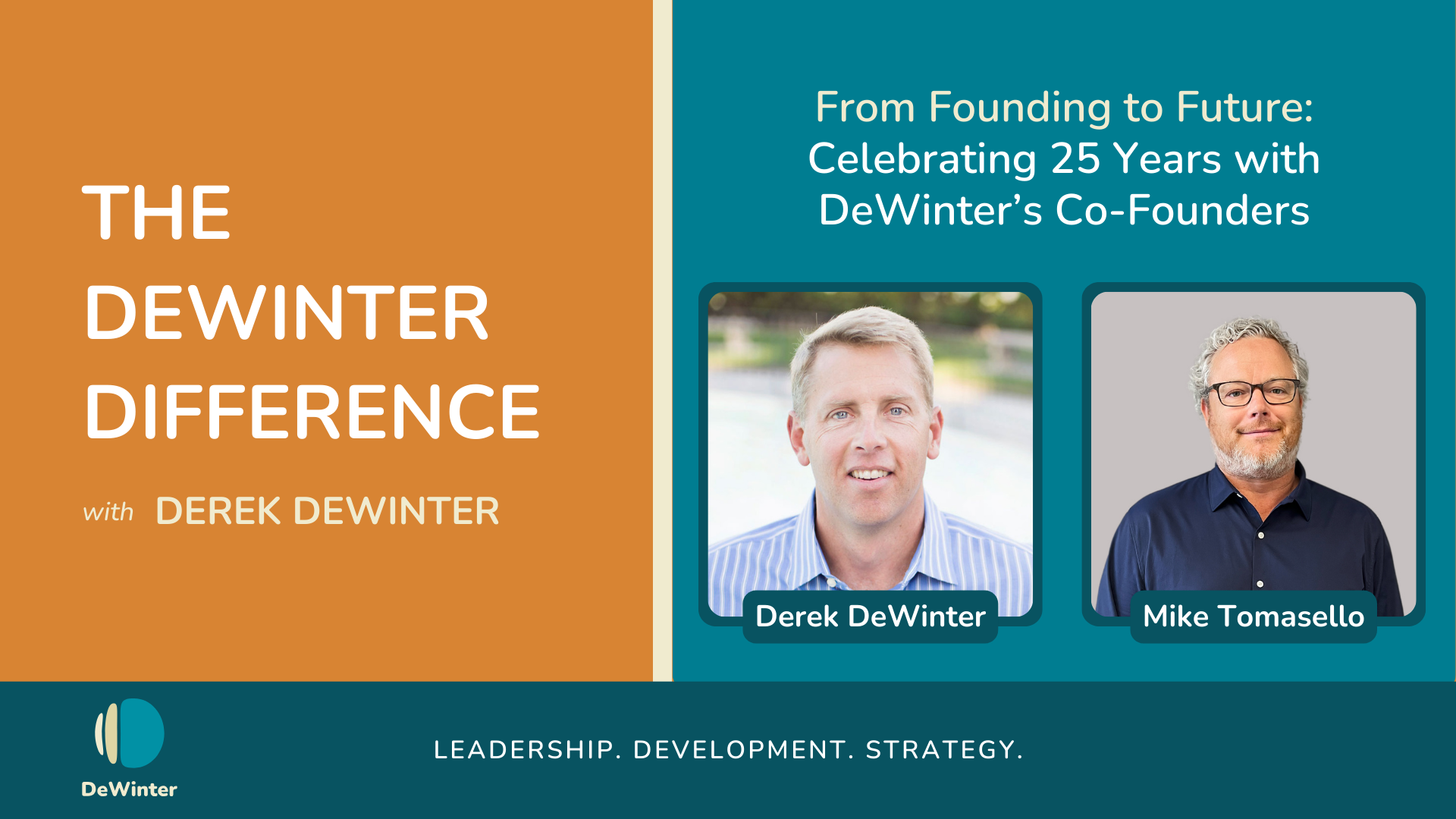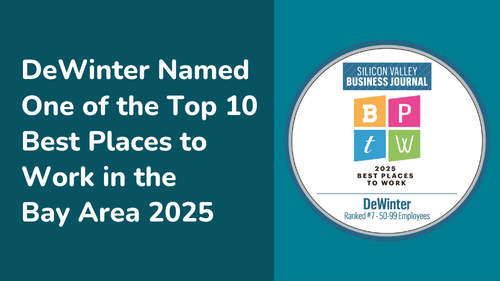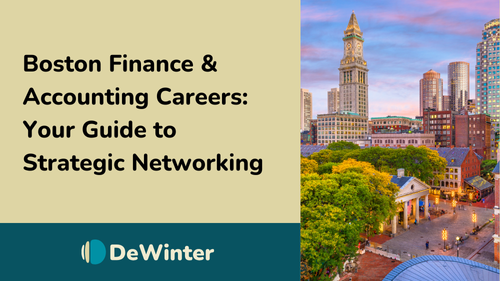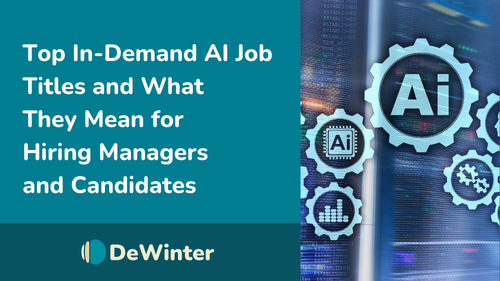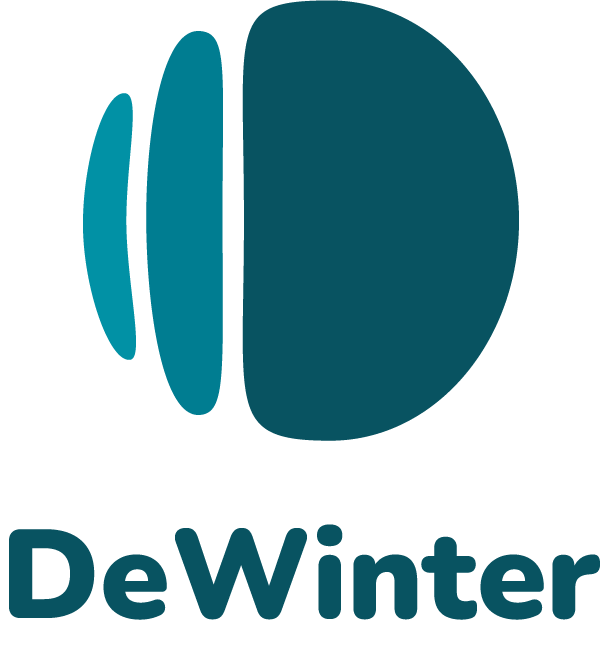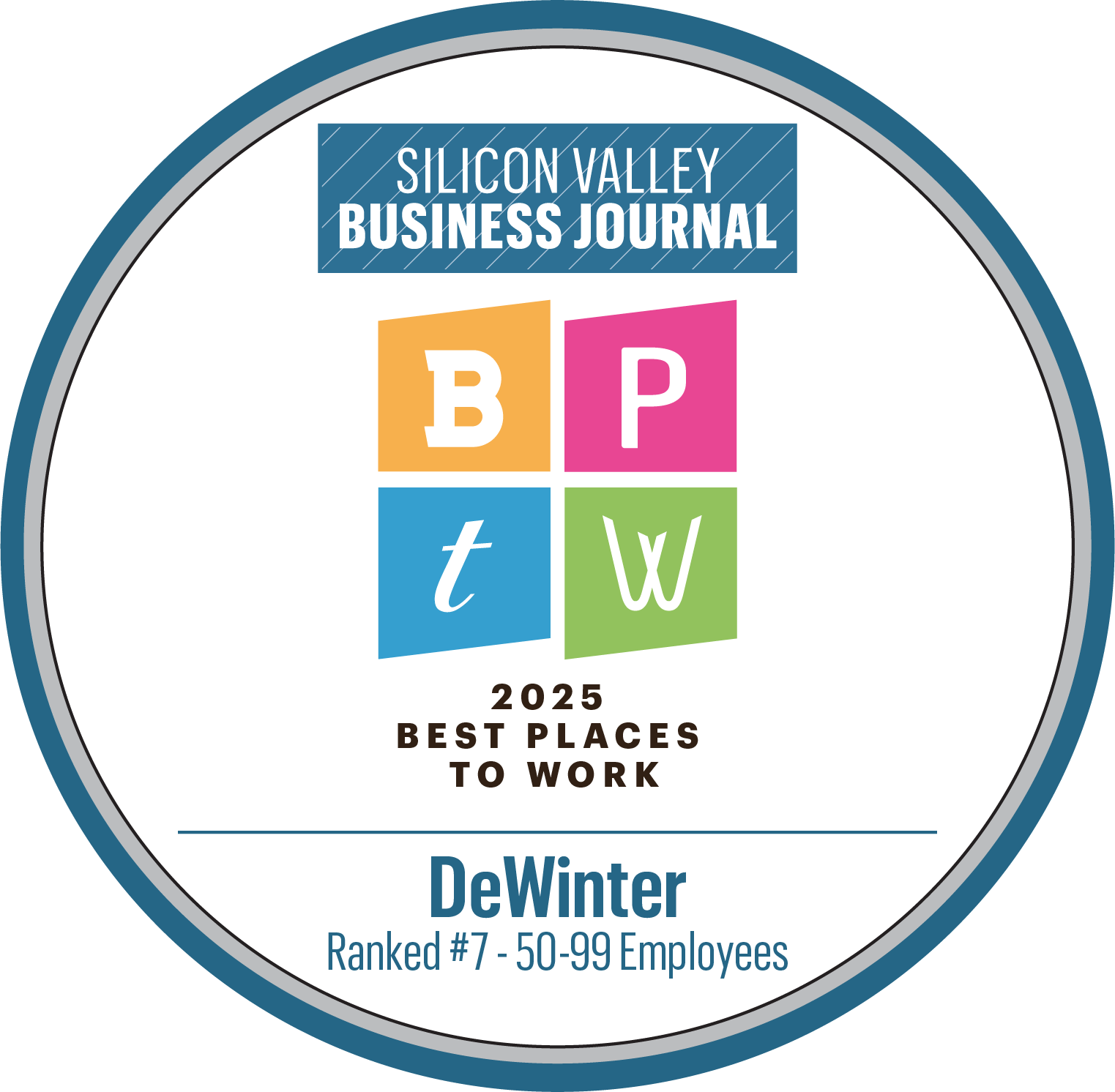The DeWinter Difference: Tyler Sloat, Chief Financial Officer at Freshworks
About The Episode
In the very first episode of the DeWinter Difference podcast, Derek DeWinter sits down with Freshworks Chief Financial Officer Tyler Sloat. Tyler shares his insights on career development, his journey from Econ and Pre-Dental undergraduate to CFO, hiring pre- and post-pandemic, and more.
Listen now at the streaming sites listed.
Learn more about the DeWinter Difference podcast here and share your thoughts and comments below.
Episode Transcript
This transcript has been edited for length and clarity.
Derek DeWinter: Welcome to our listeners who are tuning into the DeWinter Difference, an audio podcast where I spend a bit of time with incredible executives I've known for years, and you get to listen in. I hope our conversations are unique, insightful, and short enough to keep your attention, but long enough so that you get some great takeaways that you can apply in your own career. Today I have the very good fortune of speaking with Tyler Sloat, the CFO of FreshWorks. In 2021, he helped take FreshWorks public, and prior to that he spent 10 years at Zuora and has a career that includes time at iconic tech companies like Siebel Systems. Obopay and Network Appliance. We actually have a fairly unique connection in that we're both from Hawaii originally, and as this is being recorded we're really just two, three weeks away removed from the horrific tragedy that is still ongoing on Maui, which is my home.
And I hope those that are listening won't lose steam in their efforts to support them through love prayers and even donations, or hopefully donations. So, Tyler, thanks for being here.
Tyler Sloat:: Happy to be here, man. I agree. I think I told you I had my mom over from Oahu last weekend. And then my, my brother actually works for Hawaiian Airlines still in Honolulu, and they, you know, they, I. Had to kick into emergency mode. I just it's, I just think so much worse than what people think.
So the, the more help anybody can give, the better.
Derek DeWinter: Yeah, it's going to be an ongoing theme around here for a bit of time. I hope really is mind-boggling what's going on. So one of the other unique connections that we have, which I didn't realize or, or I had to remind myself of in addition to being from Hawaii, we both started our careers at Coopers and Lybrand, which is kind of funny.
Tyler Sloat: It's, I mean, it, yeah, it is also crazy how, how long the tentacles can reach. I still talk to some of the folks that I started in Boston, Coopers and iBrand in the Computer Assurance Services group and you know, some are still partners at PWC or others or CFOs or even some retired now, which good for them. But yeah, it's, it's pretty cool alumni group to have.
Derek DeWinter:
Well, and you know, given that our paths are, are somewhat similar, at least to start we took different trajectories at some point in time, but those listening may not fully appreciate the start of your career where it began. So maybe take us back to a few of the early decisions you made. Starting with going to college basically 5,000 miles away.
Tyler Sloat: Yeah, I tell people that, so I went to Boston College and folks think about that from Hawaii. They go, wow, that's crazy. But the reality is I went to a high school called Punahou, you know it well. And great school where everybody, you know, pretty much goes to the mainline for school.
It's not a hundred percent true, but a lot of people do. Actually, I had 12 kids from my graduating class went to BC. I was a little bit different because my mom was a professor at Hawaii Manoa. She was a nursing professor and then it was really my parents got divorced when I was pretty young.
And it was just my, kind of my brothers and, and my mom and I on the island. And we didn't, we didn't have a lot, so we didn't travel a ton. Outside of some stuff I would like go to summer camps and stuff. I. I'd never been to Boston before. In fact, this is, you know, applying before internet.
So it was really just applying based on brochures and the story goes, I was deciding between Holy Cross and BC. Because based on brochures, they market themselves as kind of the same exact school, right? In a suburb of Boston kind of Catholic organizations. I was going to play football at Holy Cross and it really just came down to dollars and BC ended up giving me more money which was important.
And so I ended up showing up in Boston. Never been before, but my brother was a senior at MIT when I was a freshman at BC and he said, You know, we were typical brothers. We didn't talk that much, but he's like, Hey, why don't you just come out a little bit early? So I, I dropped my bags off at BC. I literally showed up, took the T to campus, dropped my bags off, and then went down and lived in my brother's frat for a couple weeks and pretended to be a senior rushing all the freshmen with him, which was pretty darn fun.
And then he was there, you know, we got the overlap for a year, which was kind of cool having him being in the in the same city. So but yeah, Boston, my wife, who I met at BC loves to tell everybody that I showed up. I didn't even have a jacket. I think I headed to, headed to Filene’s Basement pretty quick in October to buy some stuff. So it was a great experience.
Derek DeWinter:
That's funny. I only went to Santa Clara in terms of distance away, which felt like. I mean, it's a long way just getting across the water. And I didn't own anything. Like I had just tank tops. Like it was crazy.
Tyler Sloat: You probably had tank tops and dolphin shorts and slippers.
Derek DeWinter:
Totally. Dolphin shorts, are you kidding me? Would we do this and kind of do the editing? We'll try to edit in some sort of picture of dolphin shorts for those who don't actually know what they are. Lots of neon, lots of dolphin shorts.
Oh. Well, hey, you know, I've been in search for 30 years, actually almost 30 years. It'll be 30 years next year, which is kind of crazy. And I, I've learned plenty of things along the way, but one thing for sure is that there's not a singular profile that guarantees success for being, for anything specifically, but in, in our case, as we're talking to A CFO here for being a CFO. That said, if I gave you a hundred dollars to spend on certain attributes, where would you allocate that money? You know, as you think about the things that have made you successful.
Tyler Sloat: Yeah. I've thought about this a little bit and what's really interesting, if I think about my career, you know, there there's investments you make in yourself, like say in school and things like that, which, which I've made some. And you know, it takes, you know, work or, or, or sacrifice in some areas. But I think that the most I've learned, it hasn't been in a classroom, it's been from folks who've been there, done that. And I, I've tried to make it a point to really realize I still have a lot to learn, but there, there's always f folks that, you know, I can learn from. And so that a hundred bucks, like if I would recommend, and I, I do recommend this to folks you know, who are kind of early in their careers, gosh, I'd break that into five different low-key breakfasts that you take.
You invite, you know, somebody who could be a mentor out to breakfast, you know, and two to five different people potentially. And I've done that. I've just reached out randomly to folks for lunch. And what you'll find, I think specifically in the CFO community is that, you know, most, not everybody, but most people really do want to help others and with the job, but also with learnings and whatnot.
And so it's been super helpful for me in my career to kind of make some of those relationships and be able to tap into them, but just have some key learnings from folks.
Derek DeWinter:
Awesome. Have to talk about AI because you can't turn the news on, you can't open up a browser. You can't do anything without seeing AI. It's becoming incredibly prolific. And as it relates to your job as a CFO, are you more concerned or more excited about the impact on the way you do your job?
Tyler Sloat: I'm a lot more excited. I think the concern comes with diving in without actually validating. It's like, you know, old Reagan “trust but verify.” But the interesting stuff for CFO in my perspective is not necessarily all the government's compliance stuff, and a lot of that is like included in getting your books closed and if you actually look at the body of work that that is being done as part of that, so much of that is still relatively manual, but it's not like it's intelligent work per se. It’s just stuff that are repetitive tasks and, and things that actually can be replaced. Even with more accuracy, with incredibly more efficiency with, you know, some intelligence built in and automation.
And we've, you know, we've tried to build that into a lot of our functions here at FreshWorks, and we're going to continue to do that. And so that part's exciting because the thing is, that's not what I consider, you know the most exciting part of the job. And so if you can figure out how to get that done more accurately, more efficiently, then you get to actually spend more time on, on what I think the more interesting value add parts of being a CFO are, which is really around kind of business model ownership, strategy guidance and, and things like that. And so I think it's super exciting, again, I think a lot of it has to be proven out and there has to be some prudence there.
But overall, I I think this is going to be a net positive.
Derek DeWinter: As it relates to your job, this is a question that we talked about before, but as it relates to your job, just to throw your curve ball, is this something that's popping up in board meetings as it relates to your functional job? It certainly is popping up in investor conversations around AI and integration or product and all that kind of stuff, but you know, as it relates to your specific, Functional area.
Tyler Sloat: Is taking up a decent amount of mind share in both, you know, our, our product meetings, our management meetings, and our board meetings because we're injecting so much AI into the products that we sell. But for functional I would say it's not taking as much time on, the board meeting. Audit committee meetings where we actually dig in a little bit deeper into the functions.
And that's where, you know, my team gets to come in and kind of prevent, present their functions and the achievements and then what they're, each one of them is working on. In that forum, absolutely. We are positioning AI as a place that is going to help us move forward.
It's going to help a place that's going to kind of reduce risk through automation and a place that, you know, will have more adherence to SOX controls and things like that. And so yes, it is a definitely part of the discussion.
Derek DeWinter:
So you're saying that your audit committee is concerned about risk? That sounds crazy, Tyler. I'm kidding. Hey, let's say I'm interviewing with you today for a senior role in your organization. How would you compare what you're looking for today or even the way that you interview versus four years ago or a time period before Covid?
Tyler Sloat: So when I look at a company in general and, you know, just the whole organization, I really think that the company can kind of be broken down into four operational tracks that are hired, retire, quote to cash, procure to pay and corporate. And then I look at the systems people and processes across each one of those tracks.
And I think you can capture most of the operational elements within an organization. The people on my team, a lot of them have purview or pieces of each one of those tracks. And so when I'm interviewing somebody now, part of it is the same as when I was interviewing them, somebody 10 years ago, which is really around, okay, do they have the capabilities and the aptitude to be able to get the job done. Some of it's because they've done it before, but some of them may not have actually had direct experience, but they can be smart enough. And then the experience they had, have had in the past is going to be something that can be applied to whatever their new role is.
And so I don't always have to hire somebody who's, who's been there, done that for the function. But they do have to have the aptitude to be able to do it. That is the same. The same bar that has always been there. Now, I think that changes with experience and new technologies that are out there that I think somebody has to be aware of what those are open to those things and adapting.
But I think that the biggest lens that we're putting now on hiring, especially at, say somebody reports to me where the expectation is that they're not actually individual contributors. They're really, you know, building and managing teams is really what type of manager are they going to be? Are they going to be a great cultural fit?
And then lastly, now, especially at FreshWorks, where we are very much a, a multi-geographical company, but also, you know, kind of exponentially emphasized in Covid where so many folks moved away that you have to be so much better at communication and management in a remote framework.
And that's actually a very difficult skill to have. And part of that is even, specifically for accountants and things, being able to come outside of your show and communicate and reach out and create relationships. And so that is the lens that I am trying to put on things as I'm hiring folks.
Because I think even if you have the aptitude if you can't do the other part, you're not going to be successful. And so you have to have, be able to do both.
Derek DeWinter:
You are a very, very capable CFO, but if you weren't a CFO, what would you be doing?
Tyler Sloat: Yeah, you know, it's interesting, like when I first went to college, I thought I was going to be like a youth minister. And then my major actually in school, I was an econ major and a pre-dental, which is no different than pre-med. I clearly didn't go down that path. It wasn't really, it's not, that's not really recommended path for a grade point average stuff, but it was interesting to go learn.
I never had an accounting class in undergrad. In fact, when I graduated and went to Coopers, I went into computer assurance services, which was kind of it, internal controls before SOX existed. And then when I transferred to San Jose from Boston, I transferred into audit. I literally was reading a fundamentals of accounting book in my car before I walked into the office.
Because I didn't know what a debit and credit was. And then obviously quickly had to go to educate myself. Both on the job and, and go take classes. The point of that is I never necessarily thought I was going to be an accountant. That's not what I, I, I grew up to be. I actually don't necessarily even consider myself one as a CFO.
I consider myself more of an operator, and I. When I look back, I was like, okay, could, if I didn't have a job as, as a CFOi'd, I'd probably want to be somewhat of a COO or something like that. But if I was really going to do a complete career thing, to be honest, I'd probably want to follow somewhat of my mom's path and, and be a teacher if I was being super honest.
Derek DeWinter:
Well look you've been on the receiving end of a bunch of questions and while we talked about what those might look like. Before this, we did not talk about any sort of, or I don't know what sort of question you might ask me. So the zinger on this hole uh, conversation to close things out is you get to ask me a question and I don't know what it is, and hopefully, I will not put my foot really far in my mouth.
Tyler Sloat: No. Well, I mean, you, you just talked about that we started at Cooper's together, but you obviously took a completely different career track now. And so I actually have a, like a dual part question. 'cause I'd love to find out, you know, you've, you've built an incredible organization. I also know you're very involved in philanthropic efforts and things like that.
But I was kind of curious, okay, how did that happen? And then I guess as the second part of the question is going to be around what are you seeing in the best possible? Candidates today, what are, what are you, you asked me about interviewing, but when you are looking for an executive or something for one of your clients, or even, you know, somebody else, what are the attributes that you're looking for the most in those folks?
Because I think that'd be interesting for me to hear, but also anybody who's listening to this. And then lastly, outside of work, I know you're involved in a great organization in San Jose, but like, what, what drives you every day? To just kind of get up in the morning and go perform? So it's a three-part question there.
Derek DeWinter:
Jesus. Wow. Look at what you did to me. Okay, so Coopers well, you know I guess I followed my heart, which is my wife who was an accounting major at Santa Clara. And that seemed like a good idea. So I declared accounting and I became an accounting major. And while you had to read about debits and credits in a book on the way to the office, I struggled with that for, you know, through all of my education.
I just never really embraced the accounting path yet. I followed it because it seemed like, you know, I declared my major, I'm going to go and do public accounting, and when I was there, I didn't do well. I mean, that's probably not the best thing to say for everyone to listen to, but I did very poorly. I wasn't highly rated.
I was very well thought of, I think, you know, as it related to working with other people, but functionally, I, I was, I was marginal. And so I was actually part of a layoff at Cooper's and Lybrand about nine months into my time there, along with a handful of other folks. It wasn't a great time in the market.
It was 1994 about a year into my tenure there. And so I had a chance to kind of sit back and go, you know, do a little bit of a pause and say, you know, I've been following this kind of riding this wave that was kind of going along to make a, a reference of the ocean, but, I finally made a decision to do something differently and I sat across from a headhunter who was talking to me about different roles, none of which I was qualified for, to be totally clear. And I liked what the role that he was playing with me and in terms of like, you know, the job that he was doing. And so I ended up kind of flipping the script on him and saying, well, what about what you do? And I remember him telling me at the time, like, be careful. You might like it. Now I'm 30 years later and clearly, I have liked it and excelled at this much more, more than I ever did in, in accounting. And so yeah, that's how I kind of got in and out of it pretty quickly. As for kind of this like what I'm seeing in the best candidates, you know, the, the older I get the more I appreciate you know, really genuineness in people's thoughtfulness. And listening. There are so many problems people try to solve overly quickly without taking in enough information.
So when I'm thinking of candidates who are over, who are selling themselves too quickly without listening to the question that's asked or thinking about the framework of how to present something I just, I tend to have a really great appreciation for somebody who's very thoughtful. Um, doesn't mean long-winded, but just, you know, really thinking about the question and how it relates to, you know, the situation at hand.
And, and that's not, people are often very quick to try to fill space with noise and then they may not actually be answering the right question at all. And so I do appreciate it when people are kind of thinking about things a little bit differently and more thoughtfully. And as it relates to kind of things that drive me when I get up every morning, you know, aside from, you know, my family and their wellbeing and trying to provide and all that kind of stuff.
You know, I've, I've done well enough over my career that that's not a significant issue every morning. But I'll take it back to an accounting term opportunity cost. You know, when I, when you're 22 or three or four, and I tell those people all the time, There you don't really think about opportunity costs as it relates to time.
And now that I'm in my, you know, over 50, you know, the opportunity cost of doing one thing versus another is, is much more dramatic. And so if I'm doing something, I want it to be really purposeful, whether it's at work or whether it's in the community, whether it's thinking about doing just the right thing. More often than, than not. That's really, I, I really look at life in terms of that. And I think it's, it's not the be not the worst way to kind of approach things.
Tyler Sloat: That's a great perspective.
Derek DeWinter:
Yeah. And I try to get back to Hawaii once in a while, get my feet in the sand in terms of, you know, perspective. So, um, and this year I will, I'm hopefully going to be able to get back in a way that I can do something as it relates to, you know, giving back, you know, going back to the tragedies on Maui that are still just, you know, unfolding in ways that we can't even begin to think about whenever this does air, which would be over the course of the next few weeks. I fear we're not going to be much further along, unfortunately, in kind of the discovery of really how crazy things have been over there. So but hopefully I'll get back. Well, I appreciate your time uh, Tyler, you're, uh, you've been a. Great to me, great to our firm over the years. You're a good man. I know you've raised a great family. You pour yourself into your work and have excelled, so I really, really appreciate you being part of our, actually our very first podcast.
Tyler Sloat: Thanks for having me, man.
Derek DeWinter:
Well done.
Tyler Sloat: I appreciate you as well, so this has been great. A lot of fun.
Derek DeWinter: Alright. My best to you buddy. Take care.

